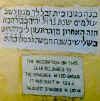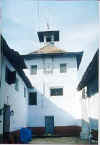|
|
||||
| Home
Society & Culture Traditional
Cultures
'Spirit of India' Jews
of India Technology Feature Technology
Investments
Films
|
|
|
||
|
the-south-asian.com March 2001 |
||||
|
Page 2 of 6
Jews of India - the
Cochin Jews Raphael Meyer "Cochin is a city whose indigenous inhabitants have welcomed, befriended and protected Jews for centuries." Jew Town, Cochin.Cochin is a handy name for a cluster of islands and towns sprinkled with
shady lagoons, tropical forests and canals winding past houses on stilts.
This is a multicultural land where, in addition to the Jewish sights, one
can see Portuguese churches, Dutch architecture, mosques, Hindu temples and
a British village green. Located in the tropical state of Kerala and alternately referred to as Venice of the East and queen of the Arabian Sea, Cochin is one the 3 largest ports on India's west coast and one of the finest natural harbours in the world. The markets are filled with the scent of spices and the shouts of vendors; the docks are lined with merchants' houses and cargo ships and the countryside is sprinkled with shady lagoons and wooded islands. The crystal-blue sky and tropical foliage, the pastel houses, the bright raw silk of the clothes and the ever-present smiles blend into one exquisite rainbow. HISTORY Twelfth-century Jewish, Christian and Muslim travelers described Jewish
settlements around Cochin. The main community was in Cranganore, north of
Cochin. For a time the Jews of the Malabar Coast served as a way station to
the Jewish community in China. In 1167 Benjamin of Tudela wrote of 1,000
Jews on the Malabar Coast "who are black like their neighbors and are
good men, observers of the law, and possess the Torah of Moses, the
Prophets, and some little knowledge of the Talmud and the halakha." The Jews prospered in Anjuvannam for more than a thousand years after the
grant of the copper plates. Then, with the extinction of the line of Rabban,
dissension arose between two brothers of a noble family for the chieftanship
of the principality The neighboring princes intervened and dispossessed the
Jews. In 1341 the brothers fled to Cochin with their followers and
established the Kochangadi synagogue there. As the Portuguese made inroads along the coast more Jews arrived in Cochin, which remained under Indian protection. Spanish and Portuguese exiles came after the Inquisition, and others arrived fleeing persecution in the Middle East. In 1560 the Portuguese set up an office of the Inquisition in Goa, halfway between Bombay and Cochin, and even more Jews sought the protection of Cheraman Parumal, the Raja of Cochin, soon labeled the "King of the Jews" by the Portuguese authorities. Raja Parumal of Cochin gave land next to his palace for the construction of a synagogue - just 30 yards away from his temple. L-R: View of synagogue from the palace; the King's temple with the synagogue in the background.The Jews could not have survived under Portuguese rule (1502-1663) had it not been for Parumal. In 1565 he gave them a strip of land next to his palace and in 1568 permitted them to build a synagogue not 30 yards from his temple. He appointed a hereditary mudaliar (chief) from among the Jews and invested the position with special privileges and jurisdiction in all internal matters in the Jewish community. This office continued in force under subsequent Rajas and even under Dutch and British rule. The Hallegua family, which still holds the title, continues to be influential in Cochin.
|
||||
| Copyright © 2000 [the-south-asian.com]. Intellectual Property. All rights reserved. | ||||
| Home |




